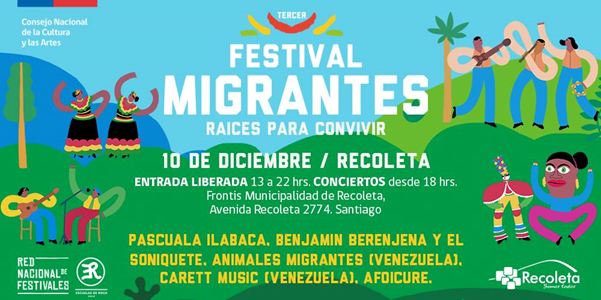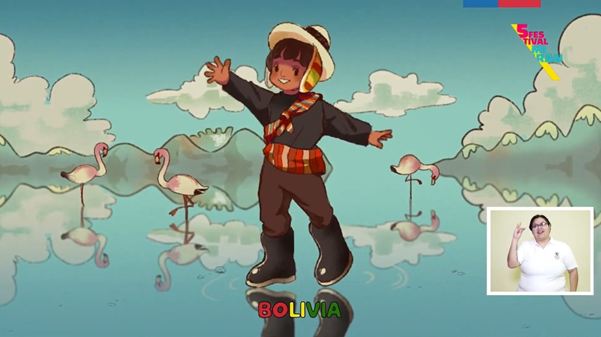By Simón Palominos.
Migration in Chile has a diverse and complex history and has played a key role in the constant reimagining of the country’s national identity. In this post I argue that the discourse of interculturality contributes to the building of a racialised and exoticised representation of migrants that legitimises social hierarchies and reinforces national identities in contemporary Chile.
Since colonial times and until the early twentieth century migration was promoted by the state as a selective and racialised process. The state attracted mostly Western European migrants, imagined as promoters of civilisation, to create the public institutions of the country, industrialise its economy and ‘improve’ the race, thus creating the fiction of Chilean ‘whiteness’, in contrast to indigenous peoples and neighbouring countries. On the other hand, migrants from non-Western countries, especially Asian and Latin American ones, were loathed by the press, intellectuals and politicians.
During the second half of the twentieth century, particularly during the right-wing dictatorship led by Augusto Pinochet (1973-1990), the doctrine of national security determined the closure of borders and the exile of opponents to the regime, producing a negative migration rate for the country. However, the return to formal democracy and the economic growth of Chile during the 1990s, and the relative political instability and economic stagnation of the wider region, made the country attractive to Latin American and Caribbean migrants, who have been increasingly relocating to Chile during the past 30 years.

Many of these migrants are of Afro-Latin American or indigenous descent and have been stigmatised by the media as associated with crime, degrading national values and negatively affecting the labour market and the availability of public services – a representation that has intensified during the COVID-19 pandemic. Migrants have also experienced racist attitudes from some sectors of the Chilean population and the state, such as discrimination at the Chilean border, limited access to services and housing, and violence against migrant children in schools. Furthermore, migration policies in Chile during the last decade have become increasingly restrictive, exemplified in the new law of immigration passed in 2021, which reduces access of migrants to social rights, and exposes them to irregular migratory status and economic exploitation.
Aware of this situation, migrant and pro-migrant organisations in Chile have advocated for the introduction of the principle of interculturality in public policy. The concept of interculturality emerged in the 1990s as an answer to the much-criticised term multiculturality. Interculturality stresses not only the co-presence of cultures but also cultural contact and exchange. In Latin America interculturality has been adopted by some states such as Mexico, Ecuador, Peru and Chile in the context of bilingual education policies and is seen as a tool for the cultural recognition of indigenous peoples within national societies. Interculturality is as much a descriptive concept as a political and epistemological project: it not only describes cultural exchange, but also outlines a future where diverse knowledge systems are recognised, and colonial power relations are overcome.
However, interculturality has also been criticised because it understands cultures as discrete units, and therefore reinforces their distinction and exoticisation based on national or ethnic identity and origin. Likewise, it has been criticised due to its instrumentalisation by national states as a device to control and reduce the politicisation of indigenous communities, therefore promoting their neoliberal policies. Authors such as Fidel Tubino (2005) and Catherine Walsh (2010) consider this a functional interculturality, and argue for a critical interculturality that would restore its political and cultural transformative potential.
Consequently, although interculturality has been promoted by some indigenous communities to claim their recognition as nations, some groups have resorted to other means. In the Chilean case, some organisations within the Mapuche people such as the Aukiñ Wallmapu Ngulam (Council of All the Lands) and the Arauco Malleco Coordination have openly rejected the intercultural approach opting instead for the direct territorial control of their ancestral lands, antagonising the Chilean state.

Furthermore, the discourse of interculturality has complex effects for those whose subaltern position within Chilean society is built precisely through national difference: migrant communities. Throughout my research on migrant musicians in Chile, I have analysed how the Chilean state frames the cultural practices of migrants through policies based on the concept of interculturality. For instance, in 2015 the Ministry of Cultures, Arts and Heritage implemented its Programme of Interculturality and Migrant Inclusion, which among other activities organises the annual ‘Festival Migrantes’. The Festival Migrantes is a state-funded event aimed to promote the recognition and inclusion of migrants in the capital city of Santiago. The event promotes intercultural exchanges between Chileans and migrants, and includes crafts, literature, workshops and musical performances of mainly migrant artists coming from diverse countries around Latin America, the Caribbean and Europe.
Nevertheless, despite the inclusive aims of the festival, the framing and representation of migrants emphasises national and racial difference (as can be seen in the poster images). Consequently, since Chilean cultural policies understand interculturality as based on discrete cultures, they enforce a national identity that cannot imagine the emergence of cultural identities were nation and ethnicity play a lesser role.

Moreover, even though cultural policies apparently oppose restrictive migration policies in the country, the exoticisation and racialisation of migrants that take place through interculturality locates migrants in a subaltern position as the Others of Chilean identity. This provides a cultural correlate to the restriction and exploitation of migrants. Consequently, in their current form Chilean intercultural policies share the same principles with restrictive migration policies, articulating with and reinforcing them.
This discussion is particularly relevant in the context of the drafting of a new constitution in Chile, where ideas of interculturality and plurinationality have been introduced transversally. Interculturality represents a specific moment in the struggle for political recognition of Otherness in Chile. However, its official state form deepens the oppression of cultural diversity, just as multiculturality did earlier. Although I do not advocate for a complete rejection of the term, I think it is important to be aware of the consequences of its use and explore alternative cultural and identity configurations beyond the nation and the state. In this sense, and paraphrasing Nandita Sharma’s Home Rule (2020), we can say that even though we know very well the negative effects of national identities, we are still far from imagining a world without nations.
Simón Palominos is a PhD student at the Department of Music, University of Bristol. His research addresses the narratives, representations and performances of migrant music in Chile.
For more information about the new migration law adopted in Chile in 2021 see previous MMB Latin America posts: ‘Inclusive language for exclusive migration policy outcomes’, which responded to the law as it was proposed in 2018, and ‘Chile’s new immigration law: an adaptable solution or further crackdown?’, which looked at the key aspects of the law in its final version. On national integration in Chile, see also our post ‘Mobility and materiality: contesting national integration on Chile’s Route 5.’
Nandita Sharma will be hosted by MMB as a Bristol Benjamin Meaker Distinguished Visiting Professor in June and July 2022. Information about her talks during this time will be available here.

